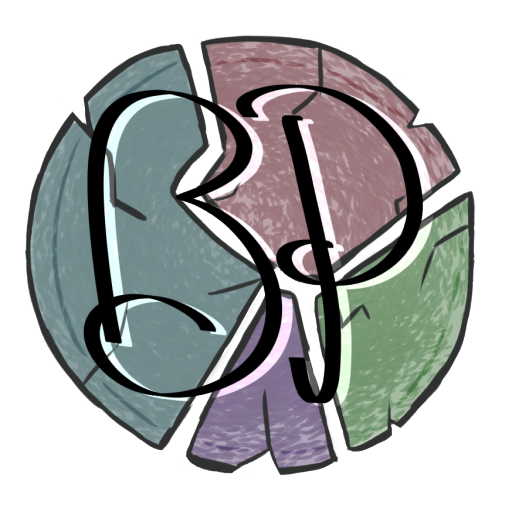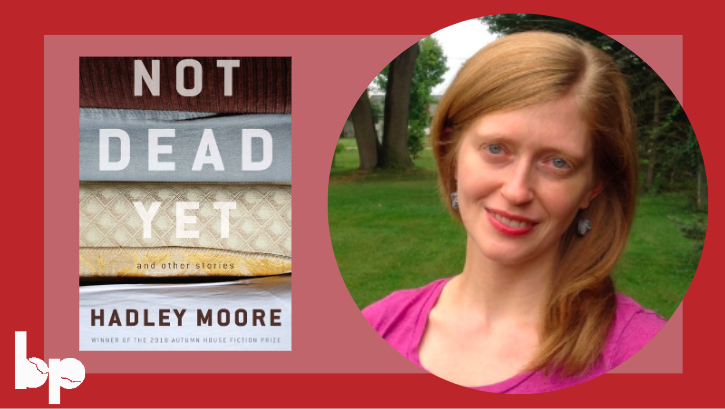 Hadley Moore has had fiction published in McSweeney’s Quarterly Concern, Witness, Amazon’s Day One, The Alaska Quarterly Review, the revived december, The Indiana Review, Anomaly, Quarter After Eight, Confrontation, The Drum, Midwestern Gothic, and elsewhere. She is an alumna of the MFA Program for Writers at Warren Wilson College and lives near Kalamazoo, Michigan.
Hadley Moore has had fiction published in McSweeney’s Quarterly Concern, Witness, Amazon’s Day One, The Alaska Quarterly Review, the revived december, The Indiana Review, Anomaly, Quarter After Eight, Confrontation, The Drum, Midwestern Gothic, and elsewhere. She is an alumna of the MFA Program for Writers at Warren Wilson College and lives near Kalamazoo, Michigan.
___
Gina Klaff & Hillary Scott: For Not Dead Yet, how did you choose to write about loss, specifically related to groups such as teenagers or the elderly?
Hadley Moore: “Choose” is a funny word when it comes to writing because, on one hand, of course I’m the one writing my own stories, making every craft choice big and small; but on the other, the writing process is so mysterious and the origin of any given story idea can be impossible to explain or pin down. I usually start a new piece with what I think of as the seed of a story; there’s a sort of exciting resonance I feel that tells me an idea is worth pursuing.
All of this is to say that I didn’t set out to write a book about loss. I wrote the nine stories in Not Dead Yet over a period of about ten years, during which time I finished my MFA, wrote and revised a novel, and started a third project. It didn’t even occur to me I was writing a collection until it was nearly complete, and when I looked at the stories I had accrued, all of which had been published separately in literary journals, it genuinely surprised me how they seemed to hang together. There’s that theme of loss, which contains the throughlines of existential dread and gallows humor. Though I don’t write autobiographically, I have to admit the dread and the jokey way of facing it are all me.
GK & HS: What was your process for establishing the voices of the characters in Not Dead Yet, especially for situations that you may not have had much experience with?
HM: Character or narrator voice is one of the elements of my story seed; I can’t think of an instance in which I haven’t started with some sense of how characters talk and think. This is true no matter how different their situations are from mine. This all gets refined in revision, certainly, especially in later rounds when I’m doing line-editing.
For example, there’s a story, “When My Father Was in Prison,” in Not Dead Yet that’s told from the perspective of a nine-year-old boy. In early drafts his thoughts and diction in spots were veering both older and younger, and I had to work to rein all of that in, keep it in line with how a nine-year-old would think and speak. In other stories with elderly characters the process is really the same though the voices are so different.
A first draft is a discovery draft, and I like giving my characters and narrators full freedom in that part of the process. Better to prune and hone later than to begin with a too-narrow perspective.
GK & HS: Was there a specific event that prompted you to write Not Dead Yet?
HM: Well, being mortal. Writing fiction is just how my brain works, and I think it is probably not surprising that that would interact with other ways my brain works, such as trying to cope with the absurd fact that we are all going to die. I am skeptical of the idea of art as therapy, or anything as therapy, really; therapy is for therapy, art is for art. But one of the purposes of art, I think, and one of the things I’m after, is to examine the world in all its difficulty and to try to make something beautiful precisely out of that examination, that deep attention. I suppose if I had to declare my philosophy of art, that’s as good as any. So no, no specific event beyond my nine story seeds—all different and each mysterious—plus just allowing my brain to do its thing.
GK & HS: What has been some of your greatest influences/inspirations for your writing?
HM: I hope it doesn’t sound too facile to say every book I’ve ever read. I have a list of my most important books, which I carry around in my wallet, books both canonical and contemporary, making up a list that is entirely idiosyncratic (and which honestly needs updating). There are also books I routinely pull off my shelves to flip through when I am stuck in my own work. I am a big fan of re-reading,
But even if I don’t love a book, I almost always finish reading it. Sometimes I am surprised and rewarded, and sometimes the lesson is to describe to myself what I think didn’t work and why—and to try to separate those questions from ones of mere taste. I used to have a rule that I had to read in groups of six: (1) one book of poetry, (2) one contemporary novel or story collection, (3) one classic of any genre, (4) one issue of a literary journal, (5) one book by someone I know, and (6) one book of literary nonfiction, though lately I’ll admit I’ve been bingeing on contemporary fiction more that anything. The point was to challenge myself and to read outside what I would normally gravitate toward. Though I‘ve been lazy lately, I still really think this is important.
GK & HS: What advice do you have for people who are looking to publish their first book?
HM: Focus on the work and try not to be in a hurry. I know there is an “eat your veggies” aspect to this answer, but it is the most important part of the writing life. Publishing is great and I won’t deny the thrill that can come with it, but artistic ambition must come first. There is nothing to be gained by trying to rush your work out into the world before it’s ready.
I went the book contest route for Not Dead Yet because that’s often a good path for story collections. There are many paths to publication, and you’ll figure yours out when the time comes. This sounds flippant, but I mean it; the information is out there, in Poets & Writers, in The Writer’s Chronicle, etc.—but first do the work.
___
Interview by:
Gina Klaff is a Fiction Editor for The Broken Plate 2020 and is a senior at Ball State University. She is majoring in Creative Writing and minoring in Professional Writing. In her free time, she enjoys eating tacos and drawing. You can follow her on Twitter @g_klaff4.
Hillary Scott is a Fiction Editor for The Broken Plate 2020. She is a senior at Ball State University with a double-major in Political Science and Pre-Law and a minor in Creative Writing.

